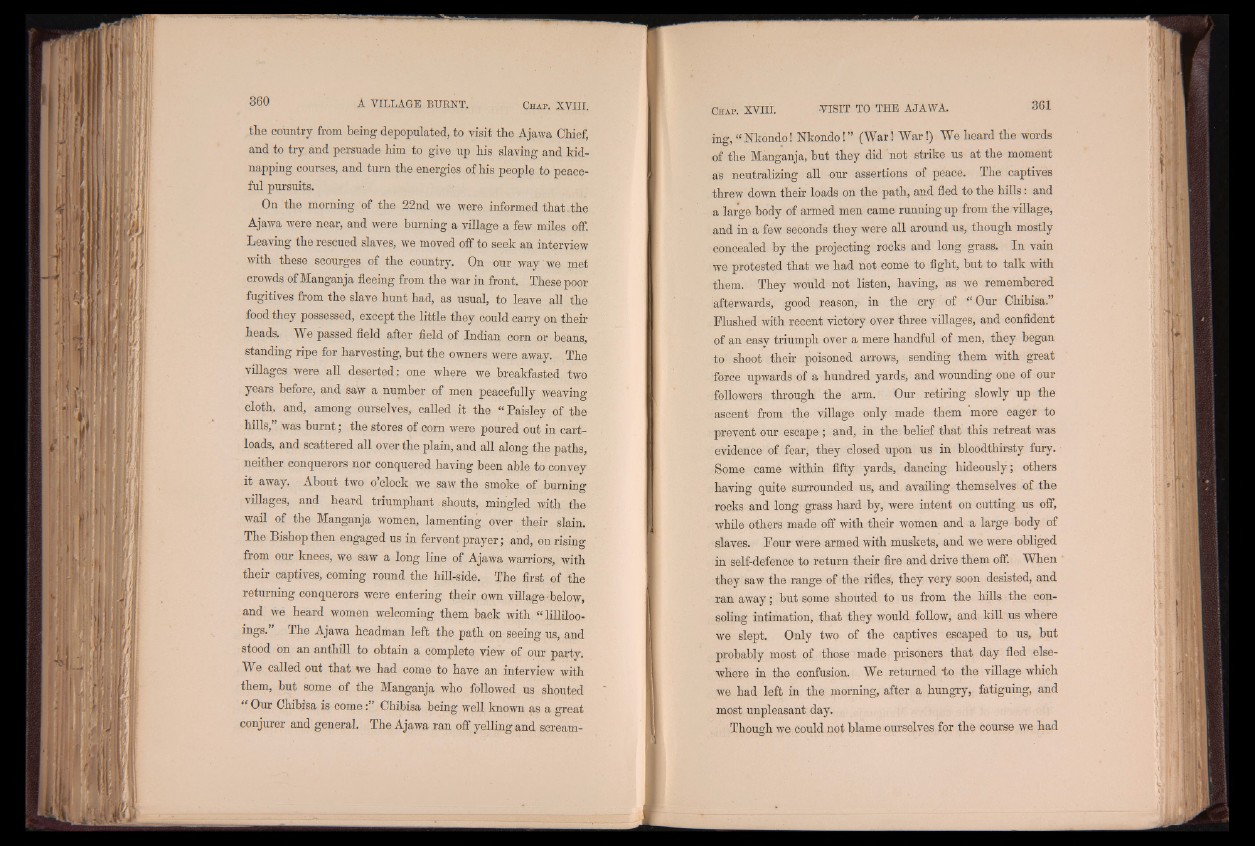
the country from being depopulated, to visit the Ajawa Chief,
and to try and persuade him to give up his slaving and kidnapping
courses, and turn the energies of his people to peaceful
pursuits.
On the morning of the 22nd we were informed that .the
Ajawa were near, and were burning a village a few miles off.
Leaving the rescued slaves, we moved off to seek an interview
with these scourges of the country. On our way we met
crowds of Manganja fleeing from the war in front. These poor
fugitives from the slave hunt had, as usual, to leave all the
food they possessed, except the little they could carry on their
heads. We passed field after field of Indian com or beans,
standing ripe for harvesting, but the owners were away. The
villages were all deserted: one where we breakfasted two
years before, and saw a number of men peacefully weaving
cloth, and, among ourselves, called it the “ Paisley of the
hills,” was burnt; the stores of com were poured out in cartloads,
and scattered all over the plain, and all along the paths,
neither conquerors nor conquered having been able to convey
it away. About two o’clock we saw the smoke of burningO
villages, and heard triumphant shouts, mingled with the
wail of the Manganja women, lamenting over their slain.
The Bishop then engaged us in fervent prayer; and, on rising
from our knees, we saw a long line of Ajawa warriors, with
their captives, coming round the hill-side. The first of the
returning conquerors were entering their own village below,
and we heard women welcoming them back with “ lilliloo-
ings.” The Ajawa headman left the path on seeing us, and
stood on an anthill to obtain a complete view of our party.
We called out that we had come to have an interview with
them, but some of the Manganja who followed us shouted
“ Our Chibisa is comeChibi sa being well known as a great
conjurer and general. The Ajawa ran off yelling and screaming,
“Nkondo! Nkondo!” (War! War!) We heard the words
of the Manganja, but they did not strike us at the moment
as neutralizing all our assertions of peace. The captives
threw down their loads on the path, and fled to the hills: and
a large body of armed men came running up from the village,
and in a few seconds they were all around us, though mostly
concealed by the projecting rocks and long grass. In vain
we protested that we had not come to fight, but to talk with
them. They would not listen, having, as we remembered
afterwards, good reason, in the cry of “ Our Chibisa.”
Flushed with recent victory over three villages, and confident
of an easy triumph over a mere handful of men, they began
to shoot their poisoned arrows, sending them with great
force upwards of a hundred yards, and wounding one of our
followers through the arm. Our retiring slowly up the
ascent from the village only made them more eager to
prevent our escape ; and, in the belief that this retreat was
evidence of fear, they closed upon us in bloodthirsty fury.
Some came within fifty yards, dancing hideously; others
having quite surrounded us, and availing themselves of the
rocks and long grass hard by, were intent on cutting us off,
while others made off with their women and a large body of
slaves. Four were armed with muskets, and we were obliged
in self-defence to return their fire and drive them off. When
they saw the range of the rifles, they very soon desisted, and
ran away; but some shouted to us from the hills the consoling
intimation, that they would follow, and kill us where
we slept. Only two of the captives escaped to us, but
probably most of those made prisoners that day fled elsewhere
in the confusion. We returned to the village which
we had left in the morning, after a hungry, fatiguing, and
most unpleasant day.
Though we could not blame ourselves for the course we had